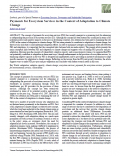Global warming and other impending environmental mega-problems call for a new technological paradigm. The urgency of the development and deployment of technological solutions is such that governments will need to make widespread use of ‘carrots and sticks’ to ensure that next-generation technologies are developed and deployed, more demanding standards and regulations are applied and stricter enforcement is guaranteed. To capture the main elements of this paradigm shift, we introduce the concept of Sustainability-oriented Innovation Systems (SoIS). SoIS make particularly high demands on governance, because governments need to disrupt unsustainable technological pathways and encourage alternative technologies long before they reach the stage of commercial viability. This implies picking winners in situations of technological uncertainty and highly disparate stakeholder preferences. SoIS also build on new types of policies that help to internalise environmental costs. The policy-driven nature of technological development may possibly result in a wide divergence of national technological trajectories.


The concept of payments for ecosystem services (PES) has recently emerged as a promising tool for enhancing or safeguarding the provision of ecosystem services (ES). Although the concept has been extensively scrutinized in terms of its potential positive and negative impacts on the poor in developing countries, less attention has been paid to examining the role of PES in the context of adaptation to climate change. PES has some potential to contribute to adaptation to climate change, but there are also risks that it could undermine adaptation efforts. In order to maximize synergies and minimize trade-offs between PES and adaptation, it is important that the conceptual links between both are made explicit. The present article presents the main conceptual links between PES and adaptation to climate change and suggests ways of making PES pro-poor and pro-adaptation.
New business models can make an important contribution to the transition to green growth. While some new business models involve large firms, others are small start-up firms that seek to exploit technological or commercial opportunities that have been neglected or not yet explored by more established firms. New firms tend to engage in more radical innovation than existing firms, and scaling up new business models can therefore help reduce environmental pollution, optimise the use of natural resources, increase productivity and energy efficiency, and provide a new source of economic growth. Although the market for green goods and services is growing, the development of new business models is affected by a range of barriers, many of which can be addressed by well-designed policies.
A green economy can be defined as one that results in improved human well-being and social equity, while significantly reducing environmental risks and ecological scarcities. It is characterised by substantially increased investments in economic sectors that build on and enhance the Earth’s natural capital or reduce ecological scarcities and environmental risks. These investments are driven or supported by national policy reforms and the development of international policy and market infrastructure.
Both fiscal policy and public finance can be key drivers of a country’s transition to a greener economy—or a brake on green growth and low carbon job creation. This paper explores the linkage and options available to policy-makers considering ways to drive and accelerate the transition to lowercarbon, more resource-efficient and socially-inclusive economic growth.
